UK Healthcare Policy: Reforms, Stakeholders, and Service User Impact
VerifiedAdded on 2023/06/14
|10
|2867
|114
Report
AI Summary
This report provides an overview of healthcare policy reforms in the UK, focusing on the changes introduced by the Labour Government (1997-2010) and the Conservative/Liberal Coalition (2010-2015). It discusses the impact of these policies on service users, including the effects of financial performance and reforms within the National Health Service (NHS). The report also examines the ideological backgrounds influencing healthcare policy development and the role of stakeholders in shaping these policies. Specific attention is given to policies developed during the coalition government, such as general practice access and treatment/drug availability, along with an analysis of the government's approach to supporting service users with long-term conditions. The report concludes by emphasizing the importance of effective healthcare policies in improving patient well-being and quality of life.
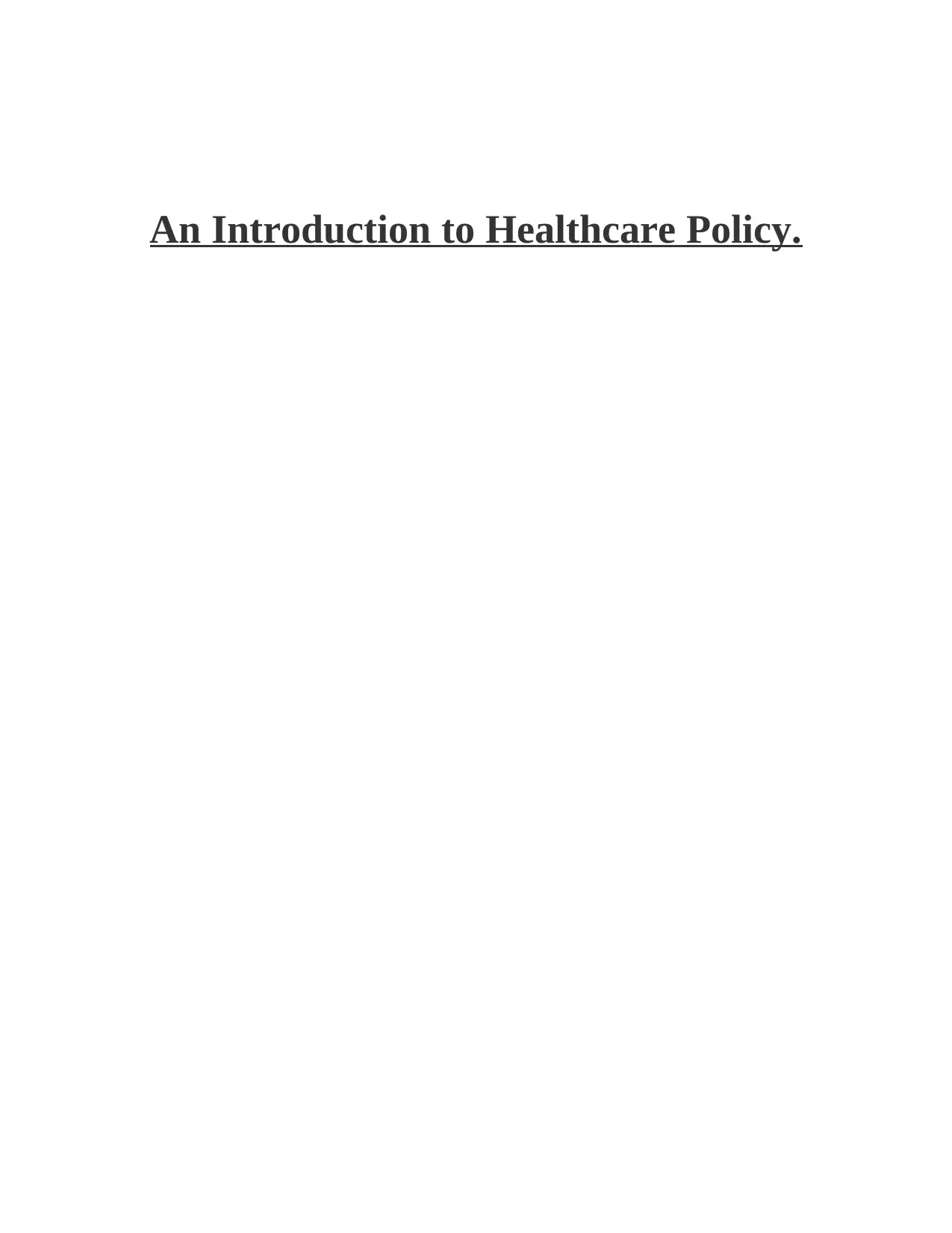
An Introduction to Healthcare Policy.
Paraphrase This Document
Need a fresh take? Get an instant paraphrase of this document with our AI Paraphraser
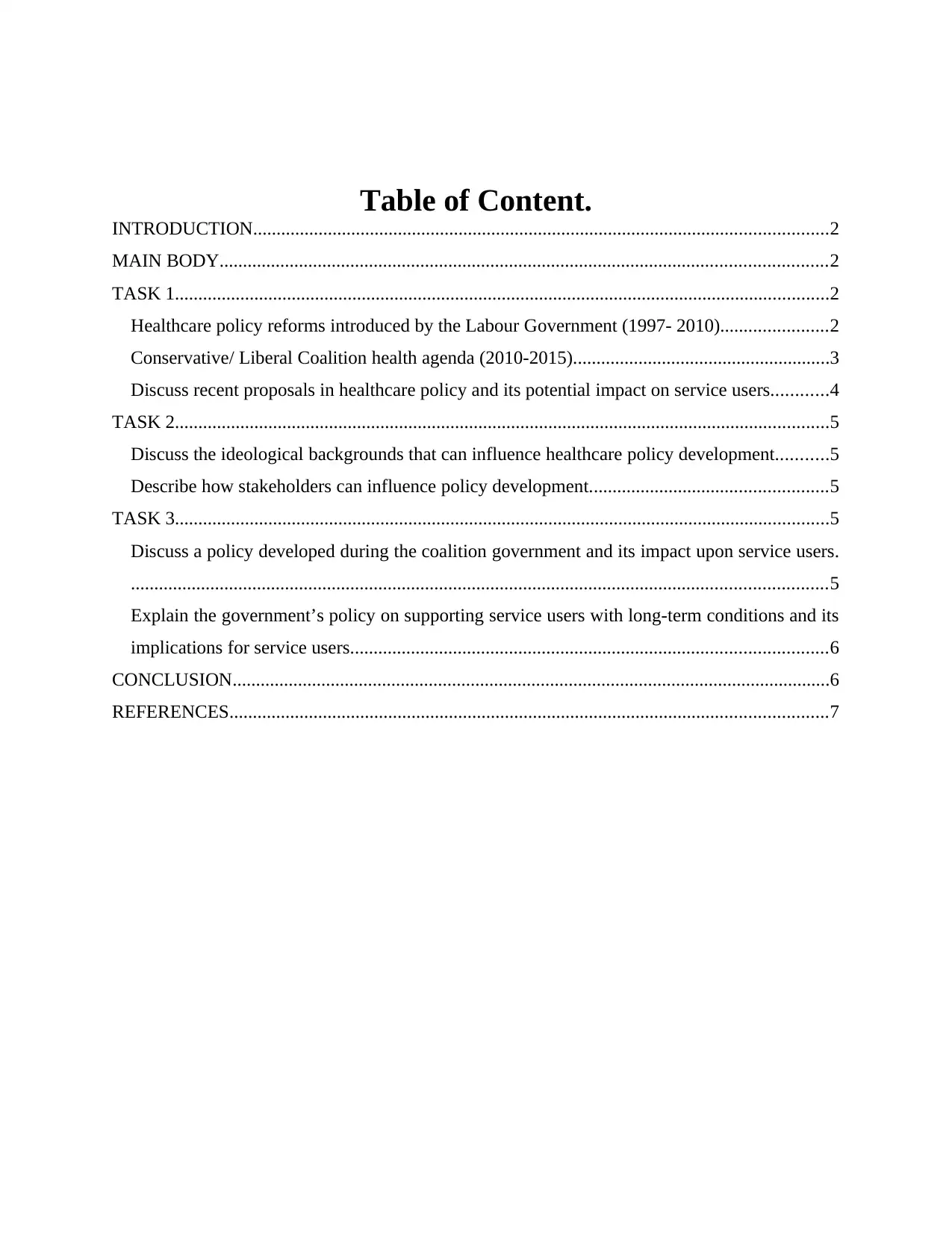
Table of Content.
INTRODUCTION...........................................................................................................................2
MAIN BODY..................................................................................................................................2
TASK 1............................................................................................................................................2
Healthcare policy reforms introduced by the Labour Government (1997- 2010).......................2
Conservative/ Liberal Coalition health agenda (2010-2015).......................................................3
Discuss recent proposals in healthcare policy and its potential impact on service users............4
TASK 2............................................................................................................................................5
Discuss the ideological backgrounds that can influence healthcare policy development...........5
Describe how stakeholders can influence policy development...................................................5
TASK 3............................................................................................................................................5
Discuss a policy developed during the coalition government and its impact upon service users.
.....................................................................................................................................................5
Explain the government’s policy on supporting service users with long-term conditions and its
implications for service users......................................................................................................6
CONCLUSION................................................................................................................................6
REFERENCES................................................................................................................................7
INTRODUCTION...........................................................................................................................2
MAIN BODY..................................................................................................................................2
TASK 1............................................................................................................................................2
Healthcare policy reforms introduced by the Labour Government (1997- 2010).......................2
Conservative/ Liberal Coalition health agenda (2010-2015).......................................................3
Discuss recent proposals in healthcare policy and its potential impact on service users............4
TASK 2............................................................................................................................................5
Discuss the ideological backgrounds that can influence healthcare policy development...........5
Describe how stakeholders can influence policy development...................................................5
TASK 3............................................................................................................................................5
Discuss a policy developed during the coalition government and its impact upon service users.
.....................................................................................................................................................5
Explain the government’s policy on supporting service users with long-term conditions and its
implications for service users......................................................................................................6
CONCLUSION................................................................................................................................6
REFERENCES................................................................................................................................7
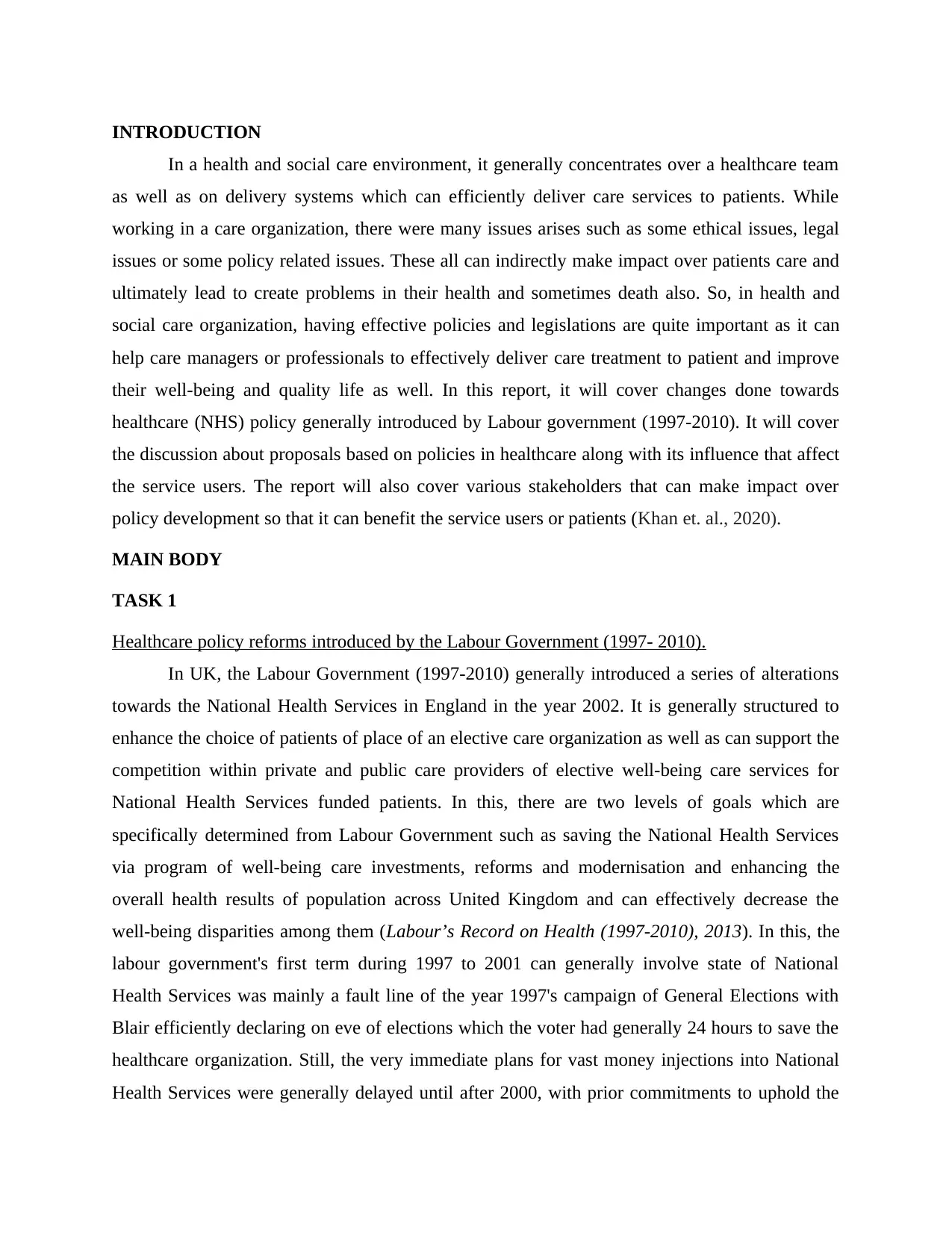
INTRODUCTION
In a health and social care environment, it generally concentrates over a healthcare team
as well as on delivery systems which can efficiently deliver care services to patients. While
working in a care organization, there were many issues arises such as some ethical issues, legal
issues or some policy related issues. These all can indirectly make impact over patients care and
ultimately lead to create problems in their health and sometimes death also. So, in health and
social care organization, having effective policies and legislations are quite important as it can
help care managers or professionals to effectively deliver care treatment to patient and improve
their well-being and quality life as well. In this report, it will cover changes done towards
healthcare (NHS) policy generally introduced by Labour government (1997-2010). It will cover
the discussion about proposals based on policies in healthcare along with its influence that affect
the service users. The report will also cover various stakeholders that can make impact over
policy development so that it can benefit the service users or patients (Khan et. al., 2020).
MAIN BODY
TASK 1
Healthcare policy reforms introduced by the Labour Government (1997- 2010).
In UK, the Labour Government (1997-2010) generally introduced a series of alterations
towards the National Health Services in England in the year 2002. It is generally structured to
enhance the choice of patients of place of an elective care organization as well as can support the
competition within private and public care providers of elective well-being care services for
National Health Services funded patients. In this, there are two levels of goals which are
specifically determined from Labour Government such as saving the National Health Services
via program of well-being care investments, reforms and modernisation and enhancing the
overall health results of population across United Kingdom and can effectively decrease the
well-being disparities among them (Labour’s Record on Health (1997-2010), 2013). In this, the
labour government's first term during 1997 to 2001 can generally involve state of National
Health Services was mainly a fault line of the year 1997's campaign of General Elections with
Blair efficiently declaring on eve of elections which the voter had generally 24 hours to save the
healthcare organization. Still, the very immediate plans for vast money injections into National
Health Services were generally delayed until after 2000, with prior commitments to uphold the
In a health and social care environment, it generally concentrates over a healthcare team
as well as on delivery systems which can efficiently deliver care services to patients. While
working in a care organization, there were many issues arises such as some ethical issues, legal
issues or some policy related issues. These all can indirectly make impact over patients care and
ultimately lead to create problems in their health and sometimes death also. So, in health and
social care organization, having effective policies and legislations are quite important as it can
help care managers or professionals to effectively deliver care treatment to patient and improve
their well-being and quality life as well. In this report, it will cover changes done towards
healthcare (NHS) policy generally introduced by Labour government (1997-2010). It will cover
the discussion about proposals based on policies in healthcare along with its influence that affect
the service users. The report will also cover various stakeholders that can make impact over
policy development so that it can benefit the service users or patients (Khan et. al., 2020).
MAIN BODY
TASK 1
Healthcare policy reforms introduced by the Labour Government (1997- 2010).
In UK, the Labour Government (1997-2010) generally introduced a series of alterations
towards the National Health Services in England in the year 2002. It is generally structured to
enhance the choice of patients of place of an elective care organization as well as can support the
competition within private and public care providers of elective well-being care services for
National Health Services funded patients. In this, there are two levels of goals which are
specifically determined from Labour Government such as saving the National Health Services
via program of well-being care investments, reforms and modernisation and enhancing the
overall health results of population across United Kingdom and can effectively decrease the
well-being disparities among them (Labour’s Record on Health (1997-2010), 2013). In this, the
labour government's first term during 1997 to 2001 can generally involve state of National
Health Services was mainly a fault line of the year 1997's campaign of General Elections with
Blair efficiently declaring on eve of elections which the voter had generally 24 hours to save the
healthcare organization. Still, the very immediate plans for vast money injections into National
Health Services were generally delayed until after 2000, with prior commitments to uphold the
⊘ This is a preview!⊘
Do you want full access?
Subscribe today to unlock all pages.

Trusted by 1+ million students worldwide
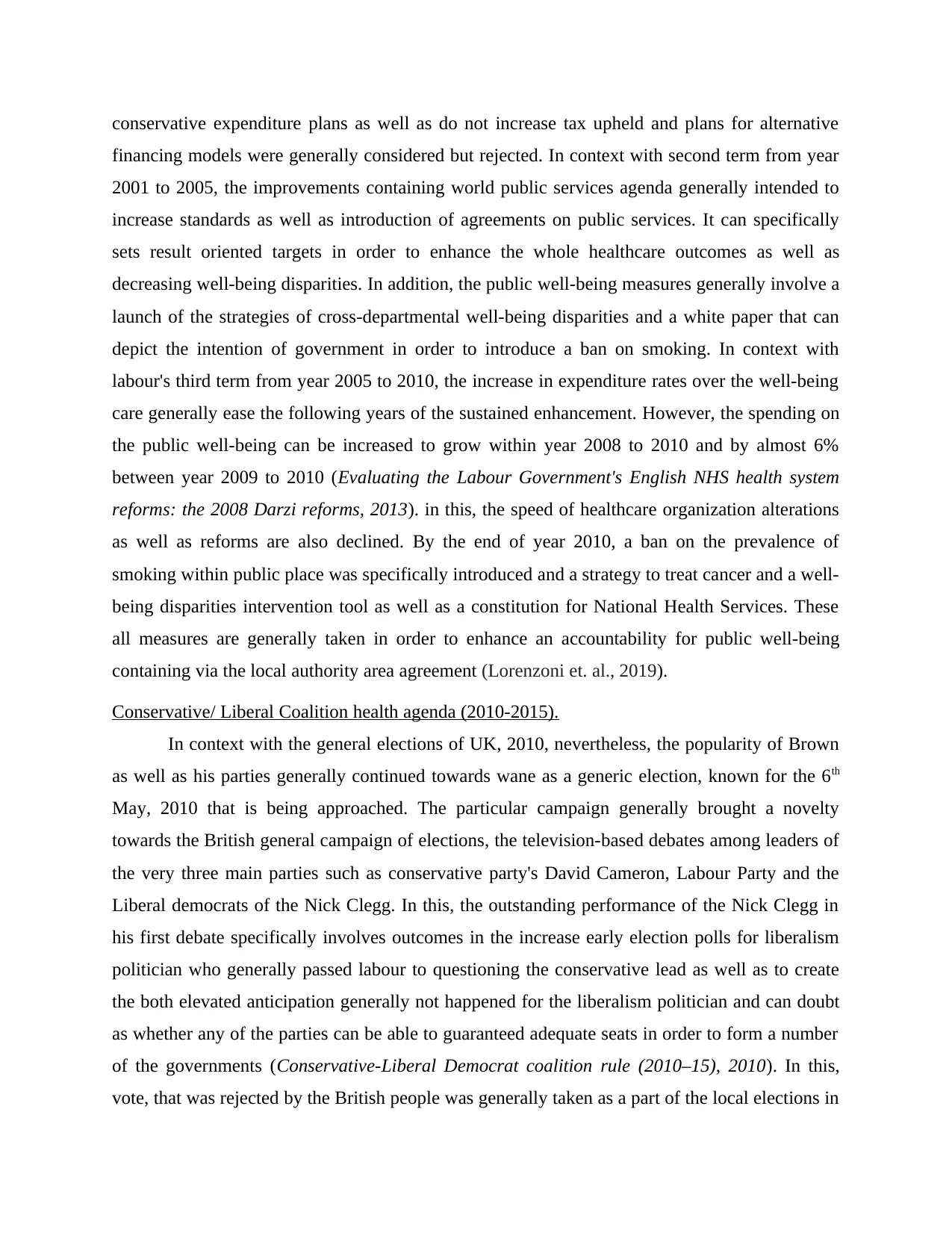
conservative expenditure plans as well as do not increase tax upheld and plans for alternative
financing models were generally considered but rejected. In context with second term from year
2001 to 2005, the improvements containing world public services agenda generally intended to
increase standards as well as introduction of agreements on public services. It can specifically
sets result oriented targets in order to enhance the whole healthcare outcomes as well as
decreasing well-being disparities. In addition, the public well-being measures generally involve a
launch of the strategies of cross-departmental well-being disparities and a white paper that can
depict the intention of government in order to introduce a ban on smoking. In context with
labour's third term from year 2005 to 2010, the increase in expenditure rates over the well-being
care generally ease the following years of the sustained enhancement. However, the spending on
the public well-being can be increased to grow within year 2008 to 2010 and by almost 6%
between year 2009 to 2010 (Evaluating the Labour Government's English NHS health system
reforms: the 2008 Darzi reforms, 2013). in this, the speed of healthcare organization alterations
as well as reforms are also declined. By the end of year 2010, a ban on the prevalence of
smoking within public place was specifically introduced and a strategy to treat cancer and a well-
being disparities intervention tool as well as a constitution for National Health Services. These
all measures are generally taken in order to enhance an accountability for public well-being
containing via the local authority area agreement (Lorenzoni et. al., 2019).
Conservative/ Liberal Coalition health agenda (2010-2015).
In context with the general elections of UK, 2010, nevertheless, the popularity of Brown
as well as his parties generally continued towards wane as a generic election, known for the 6th
May, 2010 that is being approached. The particular campaign generally brought a novelty
towards the British general campaign of elections, the television-based debates among leaders of
the very three main parties such as conservative party's David Cameron, Labour Party and the
Liberal democrats of the Nick Clegg. In this, the outstanding performance of the Nick Clegg in
his first debate specifically involves outcomes in the increase early election polls for liberalism
politician who generally passed labour to questioning the conservative lead as well as to create
the both elevated anticipation generally not happened for the liberalism politician and can doubt
as whether any of the parties can be able to guaranteed adequate seats in order to form a number
of the governments (Conservative-Liberal Democrat coalition rule (2010–15), 2010). In this,
vote, that was rejected by the British people was generally taken as a part of the local elections in
financing models were generally considered but rejected. In context with second term from year
2001 to 2005, the improvements containing world public services agenda generally intended to
increase standards as well as introduction of agreements on public services. It can specifically
sets result oriented targets in order to enhance the whole healthcare outcomes as well as
decreasing well-being disparities. In addition, the public well-being measures generally involve a
launch of the strategies of cross-departmental well-being disparities and a white paper that can
depict the intention of government in order to introduce a ban on smoking. In context with
labour's third term from year 2005 to 2010, the increase in expenditure rates over the well-being
care generally ease the following years of the sustained enhancement. However, the spending on
the public well-being can be increased to grow within year 2008 to 2010 and by almost 6%
between year 2009 to 2010 (Evaluating the Labour Government's English NHS health system
reforms: the 2008 Darzi reforms, 2013). in this, the speed of healthcare organization alterations
as well as reforms are also declined. By the end of year 2010, a ban on the prevalence of
smoking within public place was specifically introduced and a strategy to treat cancer and a well-
being disparities intervention tool as well as a constitution for National Health Services. These
all measures are generally taken in order to enhance an accountability for public well-being
containing via the local authority area agreement (Lorenzoni et. al., 2019).
Conservative/ Liberal Coalition health agenda (2010-2015).
In context with the general elections of UK, 2010, nevertheless, the popularity of Brown
as well as his parties generally continued towards wane as a generic election, known for the 6th
May, 2010 that is being approached. The particular campaign generally brought a novelty
towards the British general campaign of elections, the television-based debates among leaders of
the very three main parties such as conservative party's David Cameron, Labour Party and the
Liberal democrats of the Nick Clegg. In this, the outstanding performance of the Nick Clegg in
his first debate specifically involves outcomes in the increase early election polls for liberalism
politician who generally passed labour to questioning the conservative lead as well as to create
the both elevated anticipation generally not happened for the liberalism politician and can doubt
as whether any of the parties can be able to guaranteed adequate seats in order to form a number
of the governments (Conservative-Liberal Democrat coalition rule (2010–15), 2010). In this,
vote, that was rejected by the British people was generally taken as a part of the local elections in
Paraphrase This Document
Need a fresh take? Get an instant paraphrase of this document with our AI Paraphraser
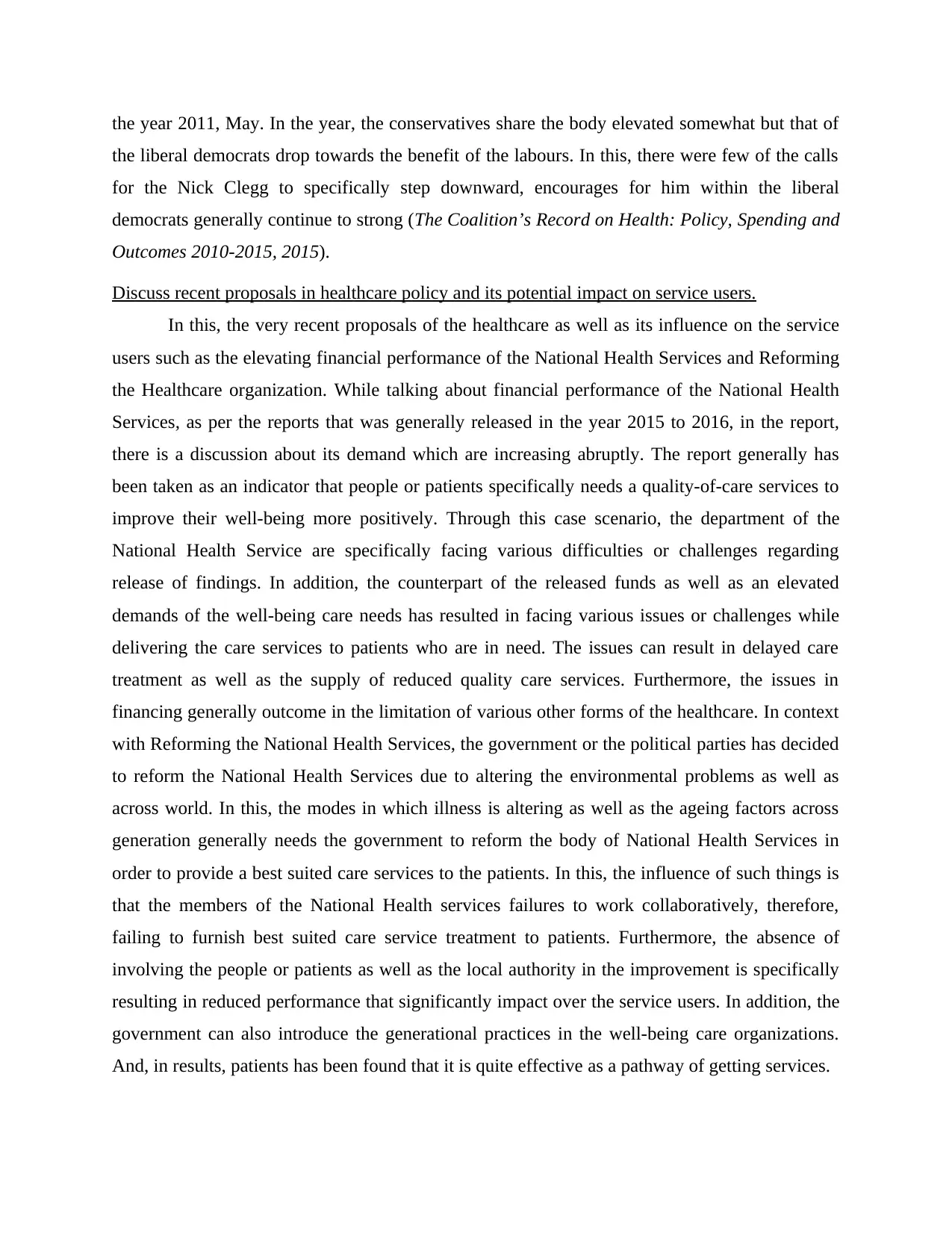
the year 2011, May. In the year, the conservatives share the body elevated somewhat but that of
the liberal democrats drop towards the benefit of the labours. In this, there were few of the calls
for the Nick Clegg to specifically step downward, encourages for him within the liberal
democrats generally continue to strong (The Coalition’s Record on Health: Policy, Spending and
Outcomes 2010-2015, 2015).
Discuss recent proposals in healthcare policy and its potential impact on service users.
In this, the very recent proposals of the healthcare as well as its influence on the service
users such as the elevating financial performance of the National Health Services and Reforming
the Healthcare organization. While talking about financial performance of the National Health
Services, as per the reports that was generally released in the year 2015 to 2016, in the report,
there is a discussion about its demand which are increasing abruptly. The report generally has
been taken as an indicator that people or patients specifically needs a quality-of-care services to
improve their well-being more positively. Through this case scenario, the department of the
National Health Service are specifically facing various difficulties or challenges regarding
release of findings. In addition, the counterpart of the released funds as well as an elevated
demands of the well-being care needs has resulted in facing various issues or challenges while
delivering the care services to patients who are in need. The issues can result in delayed care
treatment as well as the supply of reduced quality care services. Furthermore, the issues in
financing generally outcome in the limitation of various other forms of the healthcare. In context
with Reforming the National Health Services, the government or the political parties has decided
to reform the National Health Services due to altering the environmental problems as well as
across world. In this, the modes in which illness is altering as well as the ageing factors across
generation generally needs the government to reform the body of National Health Services in
order to provide a best suited care services to the patients. In this, the influence of such things is
that the members of the National Health services failures to work collaboratively, therefore,
failing to furnish best suited care service treatment to patients. Furthermore, the absence of
involving the people or patients as well as the local authority in the improvement is specifically
resulting in reduced performance that significantly impact over the service users. In addition, the
government can also introduce the generational practices in the well-being care organizations.
And, in results, patients has been found that it is quite effective as a pathway of getting services.
the liberal democrats drop towards the benefit of the labours. In this, there were few of the calls
for the Nick Clegg to specifically step downward, encourages for him within the liberal
democrats generally continue to strong (The Coalition’s Record on Health: Policy, Spending and
Outcomes 2010-2015, 2015).
Discuss recent proposals in healthcare policy and its potential impact on service users.
In this, the very recent proposals of the healthcare as well as its influence on the service
users such as the elevating financial performance of the National Health Services and Reforming
the Healthcare organization. While talking about financial performance of the National Health
Services, as per the reports that was generally released in the year 2015 to 2016, in the report,
there is a discussion about its demand which are increasing abruptly. The report generally has
been taken as an indicator that people or patients specifically needs a quality-of-care services to
improve their well-being more positively. Through this case scenario, the department of the
National Health Service are specifically facing various difficulties or challenges regarding
release of findings. In addition, the counterpart of the released funds as well as an elevated
demands of the well-being care needs has resulted in facing various issues or challenges while
delivering the care services to patients who are in need. The issues can result in delayed care
treatment as well as the supply of reduced quality care services. Furthermore, the issues in
financing generally outcome in the limitation of various other forms of the healthcare. In context
with Reforming the National Health Services, the government or the political parties has decided
to reform the National Health Services due to altering the environmental problems as well as
across world. In this, the modes in which illness is altering as well as the ageing factors across
generation generally needs the government to reform the body of National Health Services in
order to provide a best suited care services to the patients. In this, the influence of such things is
that the members of the National Health services failures to work collaboratively, therefore,
failing to furnish best suited care service treatment to patients. Furthermore, the absence of
involving the people or patients as well as the local authority in the improvement is specifically
resulting in reduced performance that significantly impact over the service users. In addition, the
government can also introduce the generational practices in the well-being care organizations.
And, in results, patients has been found that it is quite effective as a pathway of getting services.
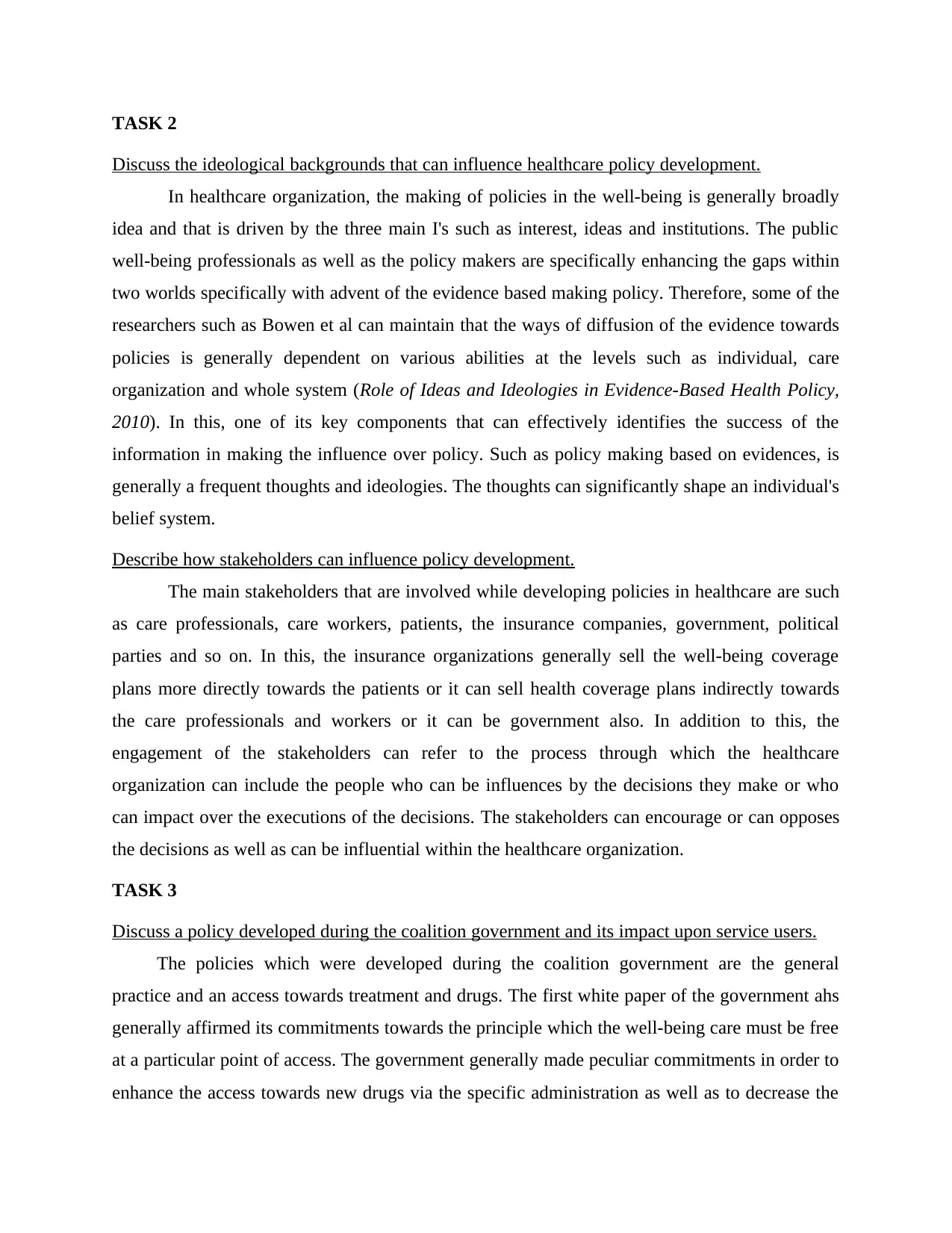
TASK 2
Discuss the ideological backgrounds that can influence healthcare policy development.
In healthcare organization, the making of policies in the well-being is generally broadly
idea and that is driven by the three main I's such as interest, ideas and institutions. The public
well-being professionals as well as the policy makers are specifically enhancing the gaps within
two worlds specifically with advent of the evidence based making policy. Therefore, some of the
researchers such as Bowen et al can maintain that the ways of diffusion of the evidence towards
policies is generally dependent on various abilities at the levels such as individual, care
organization and whole system (Role of Ideas and Ideologies in Evidence-Based Health Policy,
2010). In this, one of its key components that can effectively identifies the success of the
information in making the influence over policy. Such as policy making based on evidences, is
generally a frequent thoughts and ideologies. The thoughts can significantly shape an individual's
belief system.
Describe how stakeholders can influence policy development.
The main stakeholders that are involved while developing policies in healthcare are such
as care professionals, care workers, patients, the insurance companies, government, political
parties and so on. In this, the insurance organizations generally sell the well-being coverage
plans more directly towards the patients or it can sell health coverage plans indirectly towards
the care professionals and workers or it can be government also. In addition to this, the
engagement of the stakeholders can refer to the process through which the healthcare
organization can include the people who can be influences by the decisions they make or who
can impact over the executions of the decisions. The stakeholders can encourage or can opposes
the decisions as well as can be influential within the healthcare organization.
TASK 3
Discuss a policy developed during the coalition government and its impact upon service users.
The policies which were developed during the coalition government are the general
practice and an access towards treatment and drugs. The first white paper of the government ahs
generally affirmed its commitments towards the principle which the well-being care must be free
at a particular point of access. The government generally made peculiar commitments in order to
enhance the access towards new drugs via the specific administration as well as to decrease the
Discuss the ideological backgrounds that can influence healthcare policy development.
In healthcare organization, the making of policies in the well-being is generally broadly
idea and that is driven by the three main I's such as interest, ideas and institutions. The public
well-being professionals as well as the policy makers are specifically enhancing the gaps within
two worlds specifically with advent of the evidence based making policy. Therefore, some of the
researchers such as Bowen et al can maintain that the ways of diffusion of the evidence towards
policies is generally dependent on various abilities at the levels such as individual, care
organization and whole system (Role of Ideas and Ideologies in Evidence-Based Health Policy,
2010). In this, one of its key components that can effectively identifies the success of the
information in making the influence over policy. Such as policy making based on evidences, is
generally a frequent thoughts and ideologies. The thoughts can significantly shape an individual's
belief system.
Describe how stakeholders can influence policy development.
The main stakeholders that are involved while developing policies in healthcare are such
as care professionals, care workers, patients, the insurance companies, government, political
parties and so on. In this, the insurance organizations generally sell the well-being coverage
plans more directly towards the patients or it can sell health coverage plans indirectly towards
the care professionals and workers or it can be government also. In addition to this, the
engagement of the stakeholders can refer to the process through which the healthcare
organization can include the people who can be influences by the decisions they make or who
can impact over the executions of the decisions. The stakeholders can encourage or can opposes
the decisions as well as can be influential within the healthcare organization.
TASK 3
Discuss a policy developed during the coalition government and its impact upon service users.
The policies which were developed during the coalition government are the general
practice and an access towards treatment and drugs. The first white paper of the government ahs
generally affirmed its commitments towards the principle which the well-being care must be free
at a particular point of access. The government generally made peculiar commitments in order to
enhance the access towards new drugs via the specific administration as well as to decrease the
⊘ This is a preview!⊘
Do you want full access?
Subscribe today to unlock all pages.

Trusted by 1+ million students worldwide
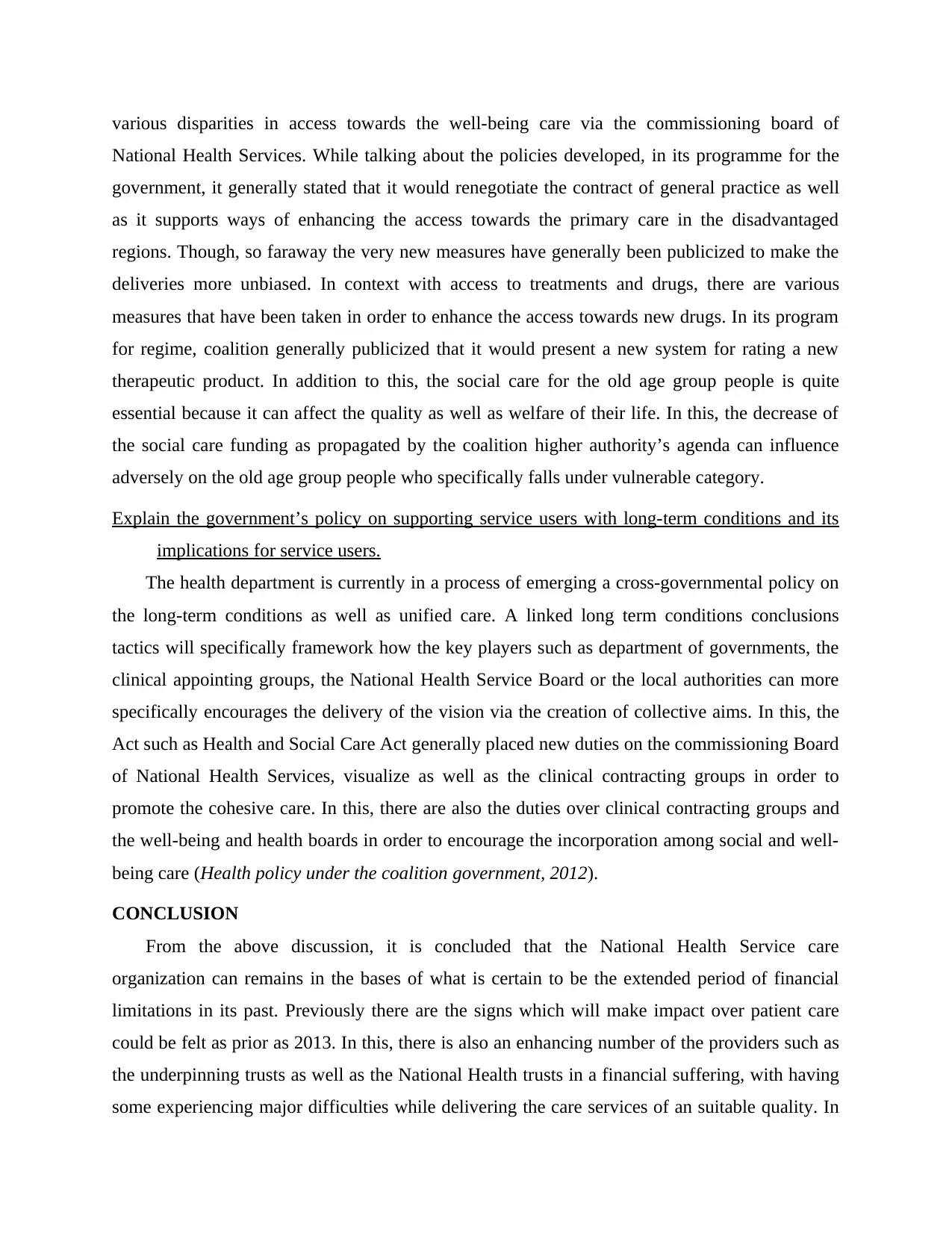
various disparities in access towards the well-being care via the commissioning board of
National Health Services. While talking about the policies developed, in its programme for the
government, it generally stated that it would renegotiate the contract of general practice as well
as it supports ways of enhancing the access towards the primary care in the disadvantaged
regions. Though, so faraway the very new measures have generally been publicized to make the
deliveries more unbiased. In context with access to treatments and drugs, there are various
measures that have been taken in order to enhance the access towards new drugs. In its program
for regime, coalition generally publicized that it would present a new system for rating a new
therapeutic product. In addition to this, the social care for the old age group people is quite
essential because it can affect the quality as well as welfare of their life. In this, the decrease of
the social care funding as propagated by the coalition higher authority’s agenda can influence
adversely on the old age group people who specifically falls under vulnerable category.
Explain the government’s policy on supporting service users with long-term conditions and its
implications for service users.
The health department is currently in a process of emerging a cross-governmental policy on
the long-term conditions as well as unified care. A linked long term conditions conclusions
tactics will specifically framework how the key players such as department of governments, the
clinical appointing groups, the National Health Service Board or the local authorities can more
specifically encourages the delivery of the vision via the creation of collective aims. In this, the
Act such as Health and Social Care Act generally placed new duties on the commissioning Board
of National Health Services, visualize as well as the clinical contracting groups in order to
promote the cohesive care. In this, there are also the duties over clinical contracting groups and
the well-being and health boards in order to encourage the incorporation among social and well-
being care (Health policy under the coalition government, 2012).
CONCLUSION
From the above discussion, it is concluded that the National Health Service care
organization can remains in the bases of what is certain to be the extended period of financial
limitations in its past. Previously there are the signs which will make impact over patient care
could be felt as prior as 2013. In this, there is also an enhancing number of the providers such as
the underpinning trusts as well as the National Health trusts in a financial suffering, with having
some experiencing major difficulties while delivering the care services of an suitable quality. In
National Health Services. While talking about the policies developed, in its programme for the
government, it generally stated that it would renegotiate the contract of general practice as well
as it supports ways of enhancing the access towards the primary care in the disadvantaged
regions. Though, so faraway the very new measures have generally been publicized to make the
deliveries more unbiased. In context with access to treatments and drugs, there are various
measures that have been taken in order to enhance the access towards new drugs. In its program
for regime, coalition generally publicized that it would present a new system for rating a new
therapeutic product. In addition to this, the social care for the old age group people is quite
essential because it can affect the quality as well as welfare of their life. In this, the decrease of
the social care funding as propagated by the coalition higher authority’s agenda can influence
adversely on the old age group people who specifically falls under vulnerable category.
Explain the government’s policy on supporting service users with long-term conditions and its
implications for service users.
The health department is currently in a process of emerging a cross-governmental policy on
the long-term conditions as well as unified care. A linked long term conditions conclusions
tactics will specifically framework how the key players such as department of governments, the
clinical appointing groups, the National Health Service Board or the local authorities can more
specifically encourages the delivery of the vision via the creation of collective aims. In this, the
Act such as Health and Social Care Act generally placed new duties on the commissioning Board
of National Health Services, visualize as well as the clinical contracting groups in order to
promote the cohesive care. In this, there are also the duties over clinical contracting groups and
the well-being and health boards in order to encourage the incorporation among social and well-
being care (Health policy under the coalition government, 2012).
CONCLUSION
From the above discussion, it is concluded that the National Health Service care
organization can remains in the bases of what is certain to be the extended period of financial
limitations in its past. Previously there are the signs which will make impact over patient care
could be felt as prior as 2013. In this, there is also an enhancing number of the providers such as
the underpinning trusts as well as the National Health trusts in a financial suffering, with having
some experiencing major difficulties while delivering the care services of an suitable quality. In
Paraphrase This Document
Need a fresh take? Get an instant paraphrase of this document with our AI Paraphraser

the meantime, the burden which social care departments are facing in local authorities are
specifically enhancing by the day as well as its impacts are already being felt in some of the
areas of care organization.
specifically enhancing by the day as well as its impacts are already being felt in some of the
areas of care organization.
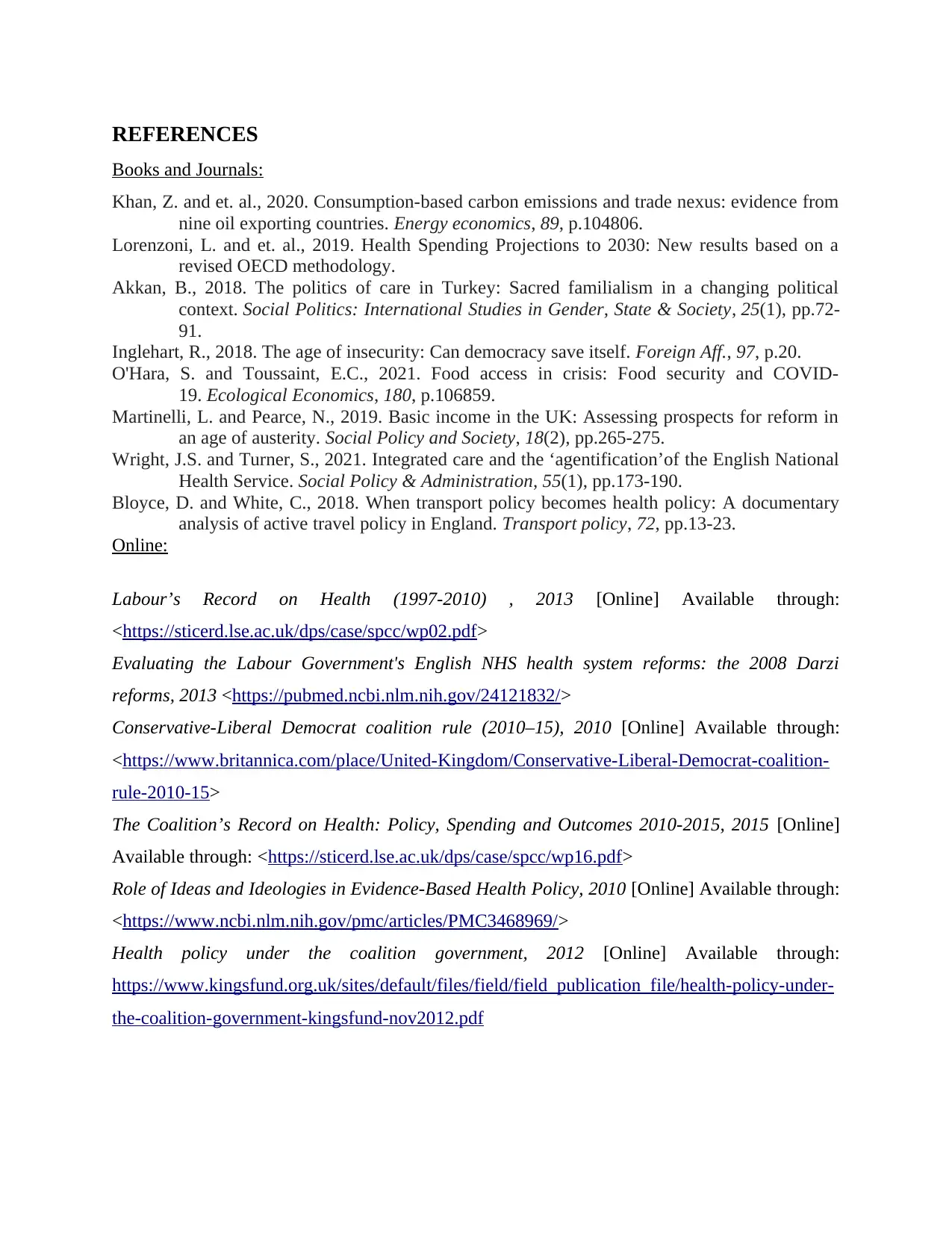
REFERENCES
Books and Journals:
Khan, Z. and et. al., 2020. Consumption-based carbon emissions and trade nexus: evidence from
nine oil exporting countries. Energy economics, 89, p.104806.
Lorenzoni, L. and et. al., 2019. Health Spending Projections to 2030: New results based on a
revised OECD methodology.
Akkan, B., 2018. The politics of care in Turkey: Sacred familialism in a changing political
context. Social Politics: International Studies in Gender, State & Society, 25(1), pp.72-
91.
Inglehart, R., 2018. The age of insecurity: Can democracy save itself. Foreign Aff., 97, p.20.
O'Hara, S. and Toussaint, E.C., 2021. Food access in crisis: Food security and COVID-
19. Ecological Economics, 180, p.106859.
Martinelli, L. and Pearce, N., 2019. Basic income in the UK: Assessing prospects for reform in
an age of austerity. Social Policy and Society, 18(2), pp.265-275.
Wright, J.S. and Turner, S., 2021. Integrated care and the ‘agentification’of the English National
Health Service. Social Policy & Administration, 55(1), pp.173-190.
Bloyce, D. and White, C., 2018. When transport policy becomes health policy: A documentary
analysis of active travel policy in England. Transport policy, 72, pp.13-23.
Online:
Labour’s Record on Health (1997-2010) , 2013 [Online] Available through:
<https://sticerd.lse.ac.uk/dps/case/spcc/wp02.pdf>
Evaluating the Labour Government's English NHS health system reforms: the 2008 Darzi
reforms, 2013 <https://pubmed.ncbi.nlm.nih.gov/24121832/>
Conservative-Liberal Democrat coalition rule (2010–15), 2010 [Online] Available through:
<https://www.britannica.com/place/United-Kingdom/Conservative-Liberal-Democrat-coalition-
rule-2010-15>
The Coalition’s Record on Health: Policy, Spending and Outcomes 2010-2015, 2015 [Online]
Available through: <https://sticerd.lse.ac.uk/dps/case/spcc/wp16.pdf>
Role of Ideas and Ideologies in Evidence-Based Health Policy, 2010 [Online] Available through:
<https://www.ncbi.nlm.nih.gov/pmc/articles/PMC3468969/>
Health policy under the coalition government, 2012 [Online] Available through:
https://www.kingsfund.org.uk/sites/default/files/field/field_publication_file/health-policy-under-
the-coalition-government-kingsfund-nov2012.pdf
Books and Journals:
Khan, Z. and et. al., 2020. Consumption-based carbon emissions and trade nexus: evidence from
nine oil exporting countries. Energy economics, 89, p.104806.
Lorenzoni, L. and et. al., 2019. Health Spending Projections to 2030: New results based on a
revised OECD methodology.
Akkan, B., 2018. The politics of care in Turkey: Sacred familialism in a changing political
context. Social Politics: International Studies in Gender, State & Society, 25(1), pp.72-
91.
Inglehart, R., 2018. The age of insecurity: Can democracy save itself. Foreign Aff., 97, p.20.
O'Hara, S. and Toussaint, E.C., 2021. Food access in crisis: Food security and COVID-
19. Ecological Economics, 180, p.106859.
Martinelli, L. and Pearce, N., 2019. Basic income in the UK: Assessing prospects for reform in
an age of austerity. Social Policy and Society, 18(2), pp.265-275.
Wright, J.S. and Turner, S., 2021. Integrated care and the ‘agentification’of the English National
Health Service. Social Policy & Administration, 55(1), pp.173-190.
Bloyce, D. and White, C., 2018. When transport policy becomes health policy: A documentary
analysis of active travel policy in England. Transport policy, 72, pp.13-23.
Online:
Labour’s Record on Health (1997-2010) , 2013 [Online] Available through:
<https://sticerd.lse.ac.uk/dps/case/spcc/wp02.pdf>
Evaluating the Labour Government's English NHS health system reforms: the 2008 Darzi
reforms, 2013 <https://pubmed.ncbi.nlm.nih.gov/24121832/>
Conservative-Liberal Democrat coalition rule (2010–15), 2010 [Online] Available through:
<https://www.britannica.com/place/United-Kingdom/Conservative-Liberal-Democrat-coalition-
rule-2010-15>
The Coalition’s Record on Health: Policy, Spending and Outcomes 2010-2015, 2015 [Online]
Available through: <https://sticerd.lse.ac.uk/dps/case/spcc/wp16.pdf>
Role of Ideas and Ideologies in Evidence-Based Health Policy, 2010 [Online] Available through:
<https://www.ncbi.nlm.nih.gov/pmc/articles/PMC3468969/>
Health policy under the coalition government, 2012 [Online] Available through:
https://www.kingsfund.org.uk/sites/default/files/field/field_publication_file/health-policy-under-
the-coalition-government-kingsfund-nov2012.pdf
⊘ This is a preview!⊘
Do you want full access?
Subscribe today to unlock all pages.

Trusted by 1+ million students worldwide

1 out of 10
Related Documents
Your All-in-One AI-Powered Toolkit for Academic Success.
+13062052269
info@desklib.com
Available 24*7 on WhatsApp / Email
![[object Object]](/_next/static/media/star-bottom.7253800d.svg)
Unlock your academic potential
Copyright © 2020–2026 A2Z Services. All Rights Reserved. Developed and managed by ZUCOL.





